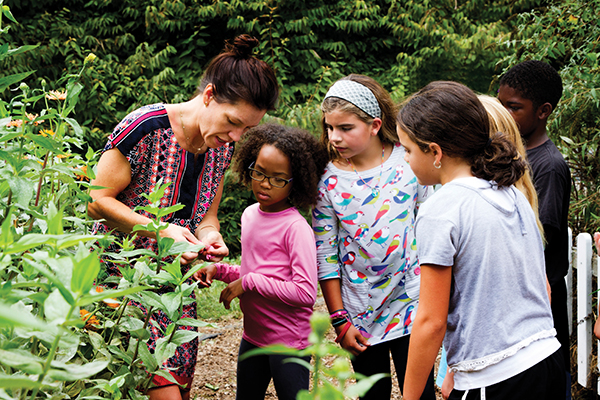Tiny Farm to Tiny Table
by Grid Staff
School cafeterias of old are notorious for mushy veggies and fried mystery meats, but students at Friends’ Central School in Wynnewood hope to promote healthful lunch hours with a new year-round food-growing program.
Students from nursery school through fifth grade are taught the significance of healthy eating by cultivating the Lower School organic garden—the foundation for Friends’ Central’s farm-to-table program—beginning with planting fruits, vegetables and herbs.
This fall, Friends’ Central launched a school lunch program called Lettuce Feed You. It features healthful meals, including vegetarian options, prepared in-house by Chef Wadiya Gooden for the school’s youngest eaters. The lunch table at the Lower School is supplied overwhelmingly by local farms, including its own expansive organic garden.
“Students are not just learning about making an impact, they’re actually living it and able to see it,” said Assistant Lower School Principal Ginger Fifer. “Last month, all the roasted potatoes on the cafeteria menu were from our garden, as well as the vegetables in the salad, the herbs in the dressing and the butternut squash.”
From enjoying food that connects to the curriculum—for example, Indian food during the first-graders’ study of India—to participating in food preparation, Lower School students use their knowledge of food to create a foundation for healthful eating.
Now in its fourth year, the Lower School garden is an integral part of the academic program. In addition to growing a number of cafeteria items on campus, the garden serves as a pumpkin patch and a butterfly garden, which both provide regular opportunities for outdoor, experiential science classes.
The new Ulmer Family Light Lab and the Natural Sciences Studio—one of four distinct makerspace studios within the Light Lab—have added depth to the students’ knowledge of how the farm-to-table program functions at the Lower School.
A group of fifth-graders recently measured pH levels and plant growth and added water with nutrients to the aeroponic towers in the solarium. They then harvested kale, arugula and leaf lettuce from the aeroponic towers to enjoy at lunch.
The new equipment has provided students an opportunity to learn the science of year-round gardening, said Brie Daley, director of the Light Lab.
“What’s nice also is that the learning is not in isolation. There’s a context as to why they’re learning aeroponics and hydroponics,” Daley said. “They’re coming in and owning these spaces and helping them to develop. It’s been a really great community project.”



